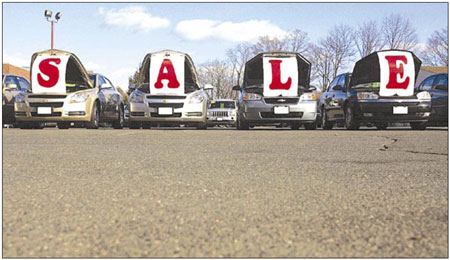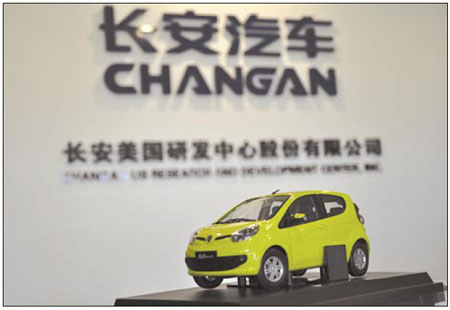Business
Down economy in US could bring more M&As
Updated: 2011-05-04 10:47
By Zhang YuWei (China Daily)
|
A "sale" is advertised at a Chevrolet dealership in Connecticut. GM, which owns Chevrolet, sold more than 2.3 million vehicles in China last year. Quan jing / For China Daily |
|
Changan opened an office near Detroit in January and is looking to hire 30 engineers by the end of the year. Zhang Yuwei / China Daily |
PLYMOUTH, Michigan - Two years ago, China overtook the United States as the world's largest auto market, keeping the attention of foreign automakers on this rapidly growing consumer market. In the meantime, Chinese automakers are catching up on mergers and acquisitions (M&A) overseas, taking advantage of a distressed global auto market caused by the financial crisis.
At a recent auto conference organized by the China General Chamber of Commerce USA (Automotive Committee) in Farmington Hills, Michigan, experts predicted that more Chinese M&A deals will emerge in 2011 and beyond.
"In the last six months to a year, we have been experiencing renewed interest from the Chinese auto companies to come to the US," said C. Peter Theut, founder and CEO of China Bridge, a Michigan-based business consulting firm that helps Chinese and US companies, with 60 percent of its clients interested in auto-related deals.
"We haven't seen many on the ground but I firmly believe that in the next couple of years we are going to experience quite a number of Chinese companies coming to this area," predicted Theut, adding that Chinese auto companies are mostly looking into distribution systems.
In 2010, sales of new cars in China rose 32 percent to top 18 million units, according to the China Association of Automobile Manufacturers. China's car output exceeded 18.2 million units - another annual increase of 32 percent - making it both the world's largest car producer and market. This has given a boost for Chinese automakers to purchase overseas assets with government support.
Last August, Zhejiang-based Geely Holding Group, one of the fastest growing Chinese automakers (which started in 1986 as a refrigerator maker) bought the Volvo car unit from Ford Motor Co in a $1.8-billion deal. This deal was the biggest foreign auto acquisition for a private Chinese company.
The trend spread around the country. Chinese automakers have shaken up Detroit - American's auto city - with a series of M&A deals in the past year after a slowdown around October 2008 because of the economic situation.
"What we are finding is that medium-sized Chinese companies - anything from $50 to $500 million - are now getting interested in coming to the West, in particular in places like Michigan," said Theut, who has more than 48 years of experience as an international business consultant and frequently travels to China.
"There have been at least five major transactions in the local area I can think of and they have been instrumental in encouraging other Chinese companies to come to the Detroit area," he added.
Just three months after the Geely deal, China's Pacific Century Motors, a joint entity by the Beijing municipal government and the Tempo Group, bought Nexteer from General Motors Co for $420 million, making it the largest Chinese investment in the American auto industry.
Nexteer's CEO Bob Remenar, who continues to lead the company after the purchase, said Pacific Century will bring more business opportunities to Nexteer and will create more jobs in Michigan.
Chinese auto parts company Wanxiang Group has taken advantage of the distressed market in the United States in the past few years. Wanxiang America, the company's American operation based in Chicago, has about 30 plants in the US and a couple in Mexico, most of which were purchased through M&A deals.
Ni Pin, Wanxiang America's president, said they had about $2 billion in sales in 2010 with more than 5,000 employees in the US, almost all Americans, with only a dozen Chinese in supporting functions.
"We purchase two or three companies every year and we save and create at least a couple hundred jobs," said Ni, adding M&A is a key piece of Wanxiang America's business.
Theut thinks it is a good time for Chinese companies to buy.
"They can buy the businesses cheaply at a bargain price now and the companies are not dying and still have a heartbeat; they can just build on their recovery and help them grow faster," he said.
"If you put aside the labor issue, there is no consumer market in the world as big as China," he said.
"US companies should look very closely at the value of the consumer market in China, and the Chinese companies should look closely at the bargains they can get in the US right now," Theut said.
American automakers rely heavily on the Chinese auto market. GM and its joint ventures sold more than 2.3 million vehicles in China in 2010, and has been the sales leader among global automakers in China the past six years.
GM's Buick, one of the four marquees the company kept when it filed for bankruptcy in 2009, has found huge success in its sales in China, which many experts say is the reason GM is still operating.
China is Buick's biggest market. Less than a year after its launch in China, Buick sales of the new LaCrosse sedan reached 100,000 units in first half of 2009.
While some are skeptical of the nature of the M&A deals, arguing China's "overseas shopping" signals a lack of operating substance, auto industry experts, including GM's president of its Europe operation Nick Reilly in a Telegraph interview, disagree and believe Chinese automakers are getting serious and are becoming very competitive.
As all the deals emerge, Chinese auto company executives see a mixed picture with opportunities and challenges ahead, highlighting cultural differences and human resources as two major hurdles for Chinese auto companies' operations overseas.
"One important element for a successful operation (of a US acquisition) is to have a good management team which is loaded with experienced (local) people," said Steve Lin, engineering manager at the BWI Group's US operation.
Beijing West Industries Group (BWI) - a supplier for brakes and suspension systems - made a $100 million purchase of former Delphi Ride Dynamics and Brakes business units in Michigan in 2009.
BWI is owned by Shougang Corporation, Beijing's Fangshan District and Bao'an Investment Development Co Ltd.
The Delphi acquisition was the first one where a Chinese State-owned company acquired a US-based global company, said Lin.
For BWI, localization is key. Lin said BWI's "transaction team" was formed by 15 locally hired consultants and retired auto industry executives in finance, tax, legal, HR, IT and product development.
China Daily
Specials

Bin Laden dead
The world's most wanted man was killed in a US raid in Pakistan.

British Royal Wedding
Prince William and Kate Middleton married at Westminster Abbey in a royal occasion of dazzling pomp and pageantry.
Best wishes

The final frontier
Xinjiang is a mysterious land of extremes that never falls to fascinate.

